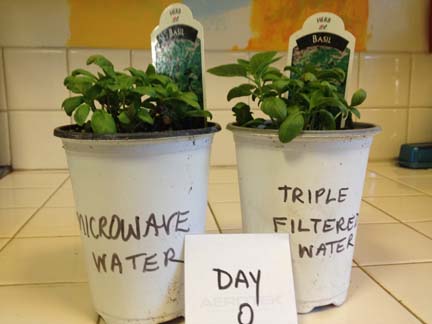I'm conducting a new experiment, based on Dr. Masaru Emoto's findings in his book "Hidden Messages In Water" (as seen in the movie "What The Bleep Do We Know"). Dr. Emoto states that the structure of water molecules changes in response to the messages received via word, music and thought messages,
I'll water three sage plants of similar height and fullness (shown in the photo below) with three different jars of water. I bought all three plants at the same local plant nursery on March 15, with the assumption that all three have received the same care.
One plant, as a control, will receive regular City of San Diego tap water. The second plant will receive tap water which will be given positive messages. The third plant will receive tap water which will be given negative messages. I filled three glass canning jars at the same time, and all three have been handled the same way other than the two receiving the positive and negative messages.
The second jar of water has been covered with sticky notes on which I have written positive messages: Love, Peace, Joy, Truth, a drawing of a flower, and a drawing of a heart. It has been placed in my bedroom where I play soothing meditation music.
 | |
| Image of Dr. Emoto's frozen water crystal after receiving the words | "Love and Gratitude" |
The third jar of water has been covered with sticky notes on which I have written negative messages: Hatred, Demon, Lies, Poverty, Anger. Hunger, Disease. It is in the living area near the TV (which produces a lot of negative messages and where my son plays video games of war and death and destruction). I will also be playing heavy metal music in this area occasionally for the purpose of this experiment.
 |
| Image of Dr. Emoto's frozen water crystal after heavy metal music is played |
Each of the sage plants will be labeled, and each will receive water from its designated jar throughout the experiment. It will be interesting to see the effect on the plants in the next 2-3 weeks. I'll post photos of the plants every 2-3 days to show how they look.
Do you think they will all grow the same? Or do you think the water they are given will have an effect on them?




